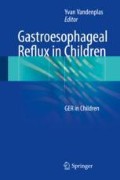Abstract
Gastroesophageal reflux (GER) refers to retrograde movement of gastric contents out of the stomach with or without regurgitation and vomiting.
Regurgitation is defined as the passage of refluxed gastric content into the oral pharynx whilst vomiting is defined as expulsion of the refluxed gastric content from the mouth. The frequency of regurgitation may vary largely in relation to age and younger infants up to first month of age are more frequently affected by regurgitation. The effect of the intestinal microflora in the pathophysiology of GER and regurgitation is becoming in the last few years more evident even though the exact mechanisms of interaction between the intestinal bacteria and host are still unknown. Probiotic might play an important role in maintaining gut homeostasis by modulating intestinal barrier function, immunity, motility and influencing the gut brain interaction. The role of intestinal microbiota in the pathogenesis of GER could represent a promising field of research in the next future.
References
Benninga MA, Nurko S, Faure C, Hyman PE, St. James Roberts I, Schechter NL. Childhood functional gastrointestinal disorders: neonate/toddler. Gastroenterology. 2016;150:1443–55.
Indrio F, Riezzo G, Raimondi F, Bisceglia M, Cavallo L, Francavilla R. The effects of probiotics on feeding tolerance, bowel habits, and gastrointestinal motility in preterm newborns. J Pediatr. 2008;152(6):801–6.
Indrio F, Riezzo G, Raimondi F, Bisceglia M, Filannino A, Cavallo L, Francavilla R. Lactobacillus reuteri accelerates gastric emptying and improves regurgitation in infants. Eur J Clin Investig. 2011 Apr;41(4):417–22.
Indrio F, Di Mauro A, Riezzo G, Civardi E, Intini C, Corvaglia L, Ballardini E, Bisceglia M, Cinquetti M, Brazzoduro E, Del Vecchio A, Tafuri S, Francavilla R. Prophylactic use of a probiotic in the prevention of colic, regurgitation, and functional constipation: a randomized clinical trial. JAMA Pediatr. 2014;168(3):228–33.
Lombardo L, Foti M, Ruggia O, et al. Increased incidence of small intestinal bacterial overgrowth during proton pump inhibitor therapy. Clin Gastroenterol Hepatology. 2010;8:504–8.
Lo WK, Chan WW. Proton pump inhibitor use and the risk of small intestinal bacterial overgrowth: a meta-analysis. Clin Gastroenterol Hepatol. 2013;11:483–90.
Del Piano M, Anderloni A, Balzarini M, Ballarè M, Carmagnola S, Montino F, Orsello M, Pagliarulo M, Tari R, Soattini L, Sforza F, Mogna L, Mogna G. The innovative potential of Lactobacillus rhamnosus LR06, Lactobacillus pentosus LPS01, Lactobacillus plantarum LP01, and Lactobacillus delbrueckii Subsp. delbrueckii LDD01 to restore the “gastric barrier effect” in patients chronically treated with PPI: a pilot study. J Clin Gastroenterol. 2012;46(Suppl):S18–26.
Compare D, Rocco A, Sgamato C, Coccoli P, Campo SM, Nazionale I, Larussa T, Luzza F, Chiodini P, Nardone G. Lactobacillus paracasei F19 versus placebo for the prevention of proton pump inhibitor-induced bowel symptoms: a randomized clinical trial. Dig Liver Dis. 2015;47(4):273–9.
Hegar B, Hutapea EI, Advani N, Vandenplas Y. A double-blind placebo-controlled randomized trial on probiotics in small bowel bacterial overgrowth in children treated with omeprazole. J Pediatr. 2013;89(4):381–7.
Rhee SH, Pothoulakis C, Mayer EA. Principles and clinical implications of the brain-gut-enteric microbiota axis. Nat Rev Gastroenterol Hepatol. 2009;6:306–14.
Collins SM, Bercik P. The relationship between intestinal microbiota and the central nervous system in normal gastrointestinal function and disease. Gastroenterology. 2009;136:2003–14.
Romijn JA, Corssmit EP, Havekes LM, et al. Gut-brain axis. Curr Opin Clin Nutr Metab Care. 2008;11:518–21.
McLean PG, Bergonzelli GE, Collins SM, et al. Targeting the microbiota-gut-brain axis to modulate behavior: which bacterial strain will translate best to humans? Proc Natl Acad Sci U S A. 2012;109:E174.
Konturek PC, Brzozowski T, Konturek SJ. Stress and the gut: pathophysiology, clinical consequences, diagnostic approach and treatment options. J Physiol Pharmacol. 2011;62:591–9.
Larauche M. Novel insights in the role of peripheral corticotropin-releasing factor and mast cells in stress-induced visceral hypersensitivity. Neurogastroenterol Motil. 2012;24:201–5.
Bale TL, Lee KF, Vale WW. The role of corticotropin-releasing factor receptors in stress and anxiety. Integr Comp Biol. 2002;42:552–5.
Bercik P, Denou E, Collins J, et al. The intestinal microbiota affect central levels of brain-derived neurotropic factor and behavior in mice. Gastroenterology. 2011;141:599–609.
Diamond B, Huerta PT, Tracey K, et al. It takes guts to grow a brain: Increasing evidence of the important role of the intestinal microflora in neuro- and immune-modulatory functions during development and adulthood. Bioessays. 2011;33:588–91.
Heijtz RD, Wang S, Anuar F, et al. Normal gut microbiota modulates brain development and behavior. Proc Natl Acad Sci U S A. 2011;108:3047–52.
Diamond B, Huerta PT, Tracey K, et al. It takes guts to grow a brain: increasing evidence of the important role of the intestinal microflora in neuro- and immune-modulatory functions during development and adulthood. Bioessays. 2011;33:588–91.2.
Lin HC. Small intestinal bacterial overgrowth: a framework for understanding irritable bowel syndrome. JAMA. 2004;292:852–8.
Cobrin GM, Abreu MT. Defects in mucosal immunity leading to Crohn’s disease. Immunol Rev. 2005;206:277–95.
Author information
Authors and Affiliations
Corresponding author
Editor information
Editors and Affiliations
Rights and permissions
Copyright information
© 2017 Springer International Publishing AG
About this chapter
Cite this chapter
Indrio, F., Cristofori, F. (2017). Gastro-oesophageal Reflux and Probiotic. In: Vandenplas, Y. (eds) Gastroesophageal Reflux in Children. Springer, Cham. https://doi.org/10.1007/978-3-319-60678-1_22
Download citation
DOI: https://doi.org/10.1007/978-3-319-60678-1_22
Published:
Publisher Name: Springer, Cham
Print ISBN: 978-3-319-60677-4
Online ISBN: 978-3-319-60678-1
eBook Packages: MedicineMedicine (R0)

